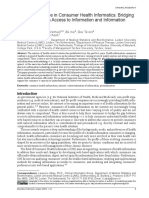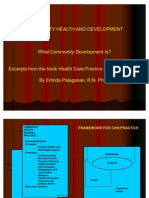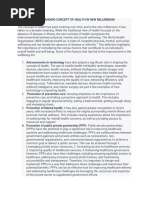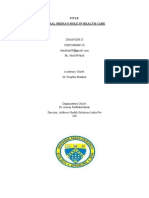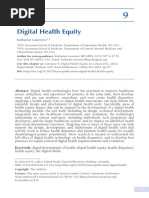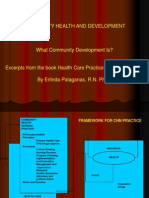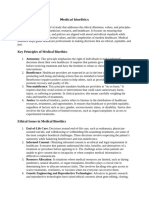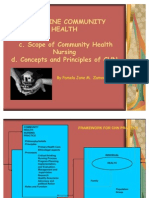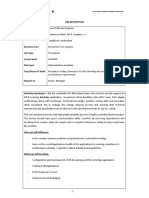0 ratings0% found this document useful (0 votes)
9 viewsPem 19 Report
Pem 19 Report
Uploaded by
jemimahjoy.tabayayThe document discusses fundamental concepts of consumer health including consumer health information and ethical issues in consumer health informatics. It covers how social information impacts consumer health through social influences on behaviors, peer support, social media, online communities and cultural influences. It also discusses the importance of securing health care information systems.
Copyright:
© All Rights Reserved
Available Formats
Download as DOCX, PDF, TXT or read online from Scribd
Pem 19 Report
Pem 19 Report
Uploaded by
jemimahjoy.tabayay0 ratings0% found this document useful (0 votes)
9 views2 pagesThe document discusses fundamental concepts of consumer health including consumer health information and ethical issues in consumer health informatics. It covers how social information impacts consumer health through social influences on behaviors, peer support, social media, online communities and cultural influences. It also discusses the importance of securing health care information systems.
Original Description:
A lecture review about Consumer Health
Original Title
PEM 19 REPORT
Copyright
© © All Rights Reserved
Available Formats
DOCX, PDF, TXT or read online from Scribd
Share this document
Did you find this document useful?
Is this content inappropriate?
The document discusses fundamental concepts of consumer health including consumer health information and ethical issues in consumer health informatics. It covers how social information impacts consumer health through social influences on behaviors, peer support, social media, online communities and cultural influences. It also discusses the importance of securing health care information systems.
Copyright:
© All Rights Reserved
Available Formats
Download as DOCX, PDF, TXT or read online from Scribd
Download as docx, pdf, or txt
0 ratings0% found this document useful (0 votes)
9 views2 pagesPem 19 Report
Pem 19 Report
Uploaded by
jemimahjoy.tabayayThe document discusses fundamental concepts of consumer health including consumer health information and ethical issues in consumer health informatics. It covers how social information impacts consumer health through social influences on behaviors, peer support, social media, online communities and cultural influences. It also discusses the importance of securing health care information systems.
Copyright:
© All Rights Reserved
Available Formats
Download as DOCX, PDF, TXT or read online from Scribd
Download as docx, pdf, or txt
You are on page 1of 2
FUNDAMENTAL CONCEPT OF CONSUMER HEALTH
I. CONSUMER HEALTH INFORMATION
Consumer Health
Consumer health refers to the well-being and healthcare choices made by individuals for
themselves and their families. It encompasses various aspects, including nutrition, exercise,
mental health, preventive care, and access to healthcare services and products. Understanding
consumer health is vital for promoting healthy lifestyles, preventing diseases, and making
informed decisions about healthcare options.
Consumer Health Information
Consumer Health Information refers to resources and materials that empower individuals to
make informed decisions about their health and healthcare. This information can be found in
various formats, such as pamphlets, websites, online forums, and mobile applications. It covers a
wide range of topics, including medical conditions, treatments, medications, preventive
measures, and lifestyle choices. Consumer Health Information plays a crucial role in promoting
health literacy, enabling individuals to understand their health needs better and navigate the
healthcare system effectively.
II. ETHICAL ISSUES IN CONSUMER HEALTH INFORMATICS
Health informatics is the application of information technology and data science to healthcare,
aiming to organize, analyze, and use health information effectively for improved well-being.
Ethical issues in consumer health informatics revolve around privacy, security, and the
responsible use of technology in healthcare. Some key concerns include:
Privacy
Safeguarding individuals' health data is crucial. Ethical dilemmas arise when
considering who has access to personal health information, how it's shared, and
the potential consequences of unauthorized access.
Informed Consent
Ensuring users are adequately informed about how their health data will be used
and obtaining explicit consent is an ongoing challenge. Transparency in data
collection practices is essential.
Data Security
Protecting health information from breaches and unauthorized access is vital. The
ethical responsibility lies in implementing robust security measures to prevent
data breaches and uphold the trust of consumers.
Equity and Accessibility
Addressing disparities in access to health informatics tools is essential. Ethical
considerations include ensuring that technological advancements benefit all
segments of the population and do not exacerbate existing healthcare disparities.
Accuracy of Information
Providing accurate and reliable health information is an ethical obligation.
Consumer health informatics platforms should prioritize the veracity of content to
avoid misinformation that could harm users.
III. SOCIAL INFORMATION AND CONSUMER HEALTH
Social information plays a significant role in consumer health, influencing various aspects of
individuals' health-related decisions and behaviors. Here are some key connections between
social information and consumer health:
Social Influence on Health Behaviors
Social networks, family, friends, and communities impact individuals' health
behaviors. Positive or negative health habits within social circles can influence
lifestyle choices, such as diet, exercise, and substance use.
Peer Support and Health Motivation
Supportive social environments contribute to better health outcomes. Having a
network that encourages and motivates individuals in their health-related goals
can enhance adherence to positive behaviors and self-care practices.
Social Media and Health Information
Social media platforms serve as sources of health information, enabling users to
access a wide range of insights, experiences, and advice. However, the quality and
accuracy of this information can vary, requiring users to critically evaluate and
verify sources.
Online Health Communities
Consumers often turn to online forums, groups, or communities to share health-
related experiences and seek advice. These platforms offer a sense of community
and shared understanding, but users should be cautious of misinformation and
seek guidance from healthcare professionals.
Cultural Influences on Health Practices
Cultural norms and values shape health practices and perceptions. Understanding
cultural context is crucial in consumer health, as it influences dietary choices,
treatment preferences, and attitudes toward seeking healthcare.
Family Health History
Understanding one's family health history provides valuable social information
for assessing genetic risks and making informed healthcare decisions. This
knowledge can guide preventive measures and early intervention.
IV. THE SECURITY OF HEALTH CARE INFORMATION SYSTEMS
The Security of Health Care Information systems refers to the protection of sensitive medical
data collected, stored, and transmitted through various health technologies. This includes
wearable devices, mobile apps, and online platforms. It involves implementing measures such as
encryption, access controls, authentication, and compliance with regulations like HIPAA to
safeguard personal health information from unauthorized access, breaches, and misuse.
Additionally, ensuring user awareness and education about privacy risks and best practices is
essential to maintain trust and confidentiality in consumer health technologies.
World Health Organization (WHO)
The World Health Organization (WHO) stands as a beacon of global health leadership,
dedicated to promoting health, preventing disease, and ensuring equitable access to healthcare
for all. Established in 1948 as a specialized agency of the United Nations, the WHO operates as a
driving force in shaping international health policies, setting standards, and coordinating efforts
to address global health challenges.
Department of Health (DOH)
The Department of Health (DOH) serves as the cornerstone of public health governance
within many countries, entrusted with the vital mission of safeguarding the health and well-being
of its citizens. Established as a governmental body, the DOH operates at the national or
subnational level, depending on the country, with a primary focus on formulating and
implementing policies, programs, and initiatives aimed at promoting health, preventing disease,
and ensuring access to quality healthcare services for all.
Prepared by:
Tabayay, Jemimah Joy
Sitjar, John Carlo
Arnaiz, Jhon Paul
Sareno, Dhoren Mae
You might also like
- Cadwell Sierra Wave EMG GuideDocument107 pagesCadwell Sierra Wave EMG Guidemarbellys100% (2)
- GROUP Powerpoint PresentationDocument32 pagesGROUP Powerpoint PresentationChristian De LumenNo ratings yet
- Principles of Health ManagementDocument4 pagesPrinciples of Health ManagementSS0% (2)
- Greg Mogenson - Northern GhosisDocument161 pagesGreg Mogenson - Northern GhosisАннаNo ratings yet
- Manual RKE2200B1-VW-G1 (EN) OrionDocument92 pagesManual RKE2200B1-VW-G1 (EN) Orionlanchon666No ratings yet
- Health Education and Information ApplicationDocument39 pagesHealth Education and Information Applicationadityakumarmanav909No ratings yet
- BHMP2-K6 Aspek Bioetika E-HealthDocument37 pagesBHMP2-K6 Aspek Bioetika E-Health121 FK Johnson KannadyNo ratings yet
- Aliandri Divisi Bioetika-Humaniora-Medikolegal & Profesionalisme MEU - Fakultas Kedokteran USU 2013Document26 pagesAliandri Divisi Bioetika-Humaniora-Medikolegal & Profesionalisme MEU - Fakultas Kedokteran USU 2013Syarifah FauziahNo ratings yet
- Cph Lec PowerpointDocument16 pagesCph Lec Powerpointfamilara2315887No ratings yet
- The Role of Public Health in Promoting Health Literacy (WWW - Kiu.ac - Ug)Document5 pagesThe Role of Public Health in Promoting Health Literacy (WWW - Kiu.ac - Ug)publication1No ratings yet
- Intelligent Consumer BehaviorDocument12 pagesIntelligent Consumer Behaviornina grace joyNo ratings yet
- Health and Wellness in the Digital Age: Navigating Information OverloadFrom EverandHealth and Wellness in the Digital Age: Navigating Information OverloadNo ratings yet
- Written Report 02.09.2023Document9 pagesWritten Report 02.09.2023Byron Jeff ToledoNo ratings yet
- Module One: Concepts, Principles and Appreoaches of Public HealthDocument9 pagesModule One: Concepts, Principles and Appreoaches of Public HealthFelix KimothoNo ratings yet
- Consumer Informatics and Digital Health - EditedDocument4 pagesConsumer Informatics and Digital Health - EditedOkoth OluochNo ratings yet
- CHAPTER 6 - Health Promoters and Their RolesDocument16 pagesCHAPTER 6 - Health Promoters and Their RolesLalita A/P AnbarasenNo ratings yet
- NUR 426 Exam 1 Study GuideDocument10 pagesNUR 426 Exam 1 Study GuideMadisonNo ratings yet
- Health Education: (GRADE 10)Document37 pagesHealth Education: (GRADE 10)paratosayoNo ratings yet
- Public Health Group AssignmentDocument7 pagesPublic Health Group AssignmentNANNYONGA OLGANo ratings yet
- Health ReviewerDocument10 pagesHealth ReviewerSlouchedNo ratings yet
- Unit 5Document20 pagesUnit 5suhagajaNo ratings yet
- Current Challenge in Consumer Health Informatics PDFDocument10 pagesCurrent Challenge in Consumer Health Informatics PDFAyres EvangNo ratings yet
- HealthcareDocument4 pagesHealthcareayaelhaimeurNo ratings yet
- Overview of Healthcare Interoperability Standards: Safer Better CareDocument38 pagesOverview of Healthcare Interoperability Standards: Safer Better CareAnis BEN JEMAA100% (1)
- Interdisciplinary Pre-Release Material May 2021 2Document2 pagesInterdisciplinary Pre-Release Material May 2021 2jishnu.rajwaniNo ratings yet
- Health: Quarter 1 - Module 1Document11 pagesHealth: Quarter 1 - Module 1TIPAY, EMELIE L.100% (1)
- Review Phiec ..Document61 pagesReview Phiec ..AbdikaniNo ratings yet
- Primary Health CareDocument8 pagesPrimary Health CareManali MangaonkarNo ratings yet
- MAPEH 10 Q1 Week 4-HealthDocument10 pagesMAPEH 10 Q1 Week 4-HealthMyla MillapreNo ratings yet
- Health LiteracyDocument13 pagesHealth LiteracyRicky CutadNo ratings yet
- DocumentDocument4 pagesDocumentMARSHANo ratings yet
- Module 1: Cosumer HealthDocument7 pagesModule 1: Cosumer HealthMary CrisNo ratings yet
- Evidence About Health Literacy and Health OutcomesDocument4 pagesEvidence About Health Literacy and Health OutcomesukhtianitaNo ratings yet
- Difference Between Health Promotion and Health EducationDocument3 pagesDifference Between Health Promotion and Health EducationElvia HidayatiNo ratings yet
- Primary Health Care 1Document13 pagesPrimary Health Care 1Hannah Villavicencio100% (1)
- Develop Assg 2Document5 pagesDevelop Assg 2agubamamarvelousNo ratings yet
- CHN Concepts 1220707432475430 8Document48 pagesCHN Concepts 1220707432475430 8Chrysolite Cueva SalvadorNo ratings yet
- The Concept of HealthDocument3 pagesThe Concept of Healthorganic mindsNo ratings yet
- Health Monitoring DeviceDocument15 pagesHealth Monitoring DeviceIvan BARRAMEDANo ratings yet
- Social Media's Role in Health CareDocument8 pagesSocial Media's Role in Health CareAmit ChoudharyNo ratings yet
- 524-Book Chapter-5426-2-10-20220425Document10 pages524-Book Chapter-5426-2-10-20220425M ArztNo ratings yet
- HAM Q nd ADocument65 pagesHAM Q nd Aglorychibambo844No ratings yet
- Informatics (Requirements)Document4 pagesInformatics (Requirements)aninNo ratings yet
- Community Health and DevelopmentDocument48 pagesCommunity Health and DevelopmentDthird Mendoza ClaudioNo ratings yet
- Medical BioethicsDocument3 pagesMedical BioethicsreethamariabijuNo ratings yet
- Consumer HealthDocument4 pagesConsumer HealthMabel AltomeaNo ratings yet
- New Project CombinedDocument10 pagesNew Project CombinedMorondiya Oluwadamilare OluwatimilehinNo ratings yet
- Community Health and DevelopmentDocument48 pagesCommunity Health and Developmentabid6027307No ratings yet
- Critical Thinking PaperDocument5 pagesCritical Thinking PaperDavid WhiteheadNo ratings yet
- The Need For Universal HealthcareDocument2 pagesThe Need For Universal Healthcaredandre.mcfarlane24No ratings yet
- Health As Human RightDocument6 pagesHealth As Human RightKyla BuddahimNo ratings yet
- HIS-Learning Feedback Diary 3Document2 pagesHIS-Learning Feedback Diary 3mio mahilig sa hugsNo ratings yet
- Module 1 CHN2 Concept of Public Health and Community Health NursingDocument40 pagesModule 1 CHN2 Concept of Public Health and Community Health Nursingnoo.wannNo ratings yet
- 2nd CLASS ENG - HEALTH PROMOTIONDocument3 pages2nd CLASS ENG - HEALTH PROMOTIONS VaibhavNo ratings yet
- Principles of Public Health: Dr. Shagufta ShahjahanDocument16 pagesPrinciples of Public Health: Dr. Shagufta ShahjahanAmar Wadood KhanNo ratings yet
- HC - Unit 2Document44 pagesHC - Unit 2Vedansha SinghalNo ratings yet
- HS 3814-01 Community Health - AY2024-T2-Learning Journal Unit 6Document7 pagesHS 3814-01 Community Health - AY2024-T2-Learning Journal Unit 6fessywan100% (1)
- Digital Heath - de Pe Pub Med, Articol SuccintDocument5 pagesDigital Heath - de Pe Pub Med, Articol SuccintLaura ȚocNo ratings yet
- Community Health ApplicationsDocument24 pagesCommunity Health Applicationspkintanar78597No ratings yet
- Patient Privacy and Social MediaDocument5 pagesPatient Privacy and Social Mediarobertngige1No ratings yet
- 4042 Right To HealthDocument2 pages4042 Right To HealthnumlumairNo ratings yet
- CHN PresentationDocument48 pagesCHN PresentationCeceni Rose Perez PareNo ratings yet
- Intro To PHPDocument18 pagesIntro To PHPHajra MirzaNo ratings yet
- Health and Wellness in the Digital Age: Navigating Information OverloadFrom EverandHealth and Wellness in the Digital Age: Navigating Information OverloadNo ratings yet
- IELTS Writing Task 2 8 Steps For A Band 8 IDP IELTSDocument9 pagesIELTS Writing Task 2 8 Steps For A Band 8 IDP IELTSAbo MoussaNo ratings yet
- Gr9 Mathematics U4 PDFDocument161 pagesGr9 Mathematics U4 PDFKaitlynne Mae GamboaNo ratings yet
- Sanjay SrivastavaDocument1 pageSanjay SrivastavaSmruti Ranjan DashNo ratings yet
- Aero Engine ReliabilityDocument4 pagesAero Engine ReliabilitySyedNadeemAhmedNo ratings yet
- CONCISE SCIENCE - Team PrabhatDocument81 pagesCONCISE SCIENCE - Team Prabhatpavan kumar srestyNo ratings yet
- Contact Lens 2 Study GuideDocument5 pagesContact Lens 2 Study GuideGenre PesselNo ratings yet
- HP Laserjet 1 1d II Iid III Iiid Iip Iip Plus Iiip 2000Document123 pagesHP Laserjet 1 1d II Iid III Iiid Iip Iip Plus Iiip 2000Sanjivi ReddyNo ratings yet
- Abstract of ASTM A394 2000Document7 pagesAbstract of ASTM A394 2000Jesse ChenNo ratings yet
- Pavilion No9Document131 pagesPavilion No9Roxana AronNo ratings yet
- 01.39480.0044 VDB004 Rev01 ADocument834 pages01.39480.0044 VDB004 Rev01 ASergio AvilaNo ratings yet
- AccountabilityDocument25 pagesAccountabilityEnrico HidalgoNo ratings yet
- Master Thesis Analysis and Specification of An AUTOSAR Based ECU in Compliance With ISO ... (PDFDrive)Document100 pagesMaster Thesis Analysis and Specification of An AUTOSAR Based ECU in Compliance With ISO ... (PDFDrive)Christoph KabekNo ratings yet
- Principles of Cooking: Theory and PracticalDocument6 pagesPrinciples of Cooking: Theory and PracticalgoverayisNo ratings yet
- Senior Software Engineer (Workday)Document4 pagesSenior Software Engineer (Workday)Koniki ChalamaiahNo ratings yet
- Research Methodology AND Review of Literature: Chapter-3Document28 pagesResearch Methodology AND Review of Literature: Chapter-3Marco RegunayanNo ratings yet
- Secrets: The AmazingDocument188 pagesSecrets: The AmazingTommy,connor gaming channelNo ratings yet
- Tapepro CatalogueDocument6 pagesTapepro CatalogueΤΣΙΜΠΙΔΗΣ ΠΑΝΑΓΙΩΤΗΣNo ratings yet
- Types of Reading and Reading TechniquesDocument3 pagesTypes of Reading and Reading TechniquesVika Fideles86% (7)
- How To Use Hints in Oracle SQL For PerformanceDocument7 pagesHow To Use Hints in Oracle SQL For PerformanceRaja SekharNo ratings yet
- EC Maths Grade 10 November 2020 P1 and MemoDocument17 pagesEC Maths Grade 10 November 2020 P1 and Memomvunimlambo121No ratings yet
- IB Amazon - COM INC. Term PaperDocument18 pagesIB Amazon - COM INC. Term PaperRavi MalhotraNo ratings yet
- Pompe-Motori-Divisori Di Flusso Ad Ingranaggi Serie L: Gear Pumps-Motors and Flow Dividers Series LDocument91 pagesPompe-Motori-Divisori Di Flusso Ad Ingranaggi Serie L: Gear Pumps-Motors and Flow Dividers Series LotandretoNo ratings yet
- Supply and Installation of New 132/22kV YASII Substation at Yas IslandDocument1 pageSupply and Installation of New 132/22kV YASII Substation at Yas IslandSivaAgathamudiNo ratings yet
- Solutions For Topic 2 - Mechanics: End-Of-Topic QuestionsDocument3 pagesSolutions For Topic 2 - Mechanics: End-Of-Topic QuestionsJoseManuelCuelloSantínNo ratings yet
- CHN FinalsDocument7 pagesCHN Finalsfatimie rozinne amilbangsaNo ratings yet
- Aim/Principle/Apparatus Required/procedure Tabulation/Circuit/ Program/Drawing Calculation & Results Viva-Voce Record Total 25 30 25 10 10 100Document3 pagesAim/Principle/Apparatus Required/procedure Tabulation/Circuit/ Program/Drawing Calculation & Results Viva-Voce Record Total 25 30 25 10 10 100Jeyakumar VenugopalNo ratings yet





















